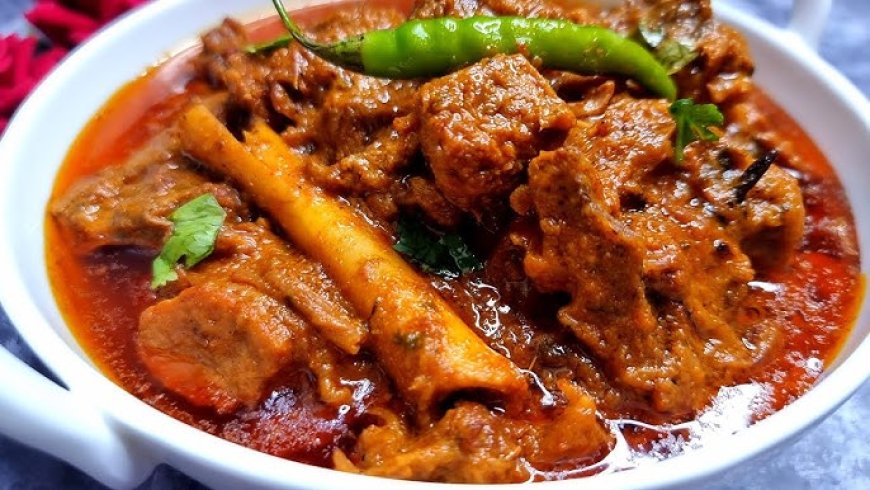Mutton vs Goat Meat - Taste, Nutrition, and Cooking Tips
Learn about mutton and goat meat, their health benefits, taste, and how to cook them with popular recipes.

Mutton and goat meat are two types of red meat that often confuse consumers. While both meats offer rich flavors and nutrients, they come from different animals and have unique characteristics. Mutton refers to the meat of older sheep, whereas goat meat comes from goats. Both meats are used in various culinary traditions worldwide, from mutton biryani to goat curry. In this blog, we’ll explore key differences between mutton and goat meat, their health benefits, and frequently asked questions to help you make informed choices.
What is Mutton ?
Mutton is the meat obtained from sheep that are over a year old. It is known for its robust and gamey flavor. Often compared to lamb, mutton is generally tougher due to the age of the animal but is favored in slow-cooked dishes like curries and stews.
What is Mutton Meat?
Mutton meat specifically comes from adult sheep, unlike lamb, which is from younger sheep under one year of age. Mutton is often darker in color and more intense in taste.
What is Mutton Fat?
Mutton fat is the white or yellowish fat found in cuts of mutton. It is flavorful but can be unhealthy if consumed in excess due to its high saturated fat content.
What Does Mutton Taste Like?
Mutton has a rich, gamey flavor that is more pronounced than lamb or goat. It can be tender if cooked slowly but can become tough if cooked at high temperatures.
Mutton vs Goat Meat: What's the Difference?
While mutton comes from sheep, goat meat comes from goats and is also called "chevon" or "cabrito" depending on the age of the animal. Goat meat is leaner and has a milder flavor compared to mutton, making it popular in various global cuisines.
Is Mutton Better Than Lamb?
Mutton is typically more affordable than lamb, but lamb is considered more tender and mild in flavor. Lamb is often used for quicker cooking methods like grilling, while mutton shines in slow-cooked dishes like curries and stews.
Why is Lamb Popular but Not Mutton?
Lamb is more popular due to its tenderness and mild flavor, making it more appealing to a broader audience. Mutton, on the other hand, has a stronger taste and is favored in specific cultural cuisines.
Nutritional Benefits of Mutton and Goat Meat
Health Advantages of Mutton
-
Rich in Protein: Mutton is an excellent source of high-quality protein, essential for muscle repair and growth.
-
High in Iron: Mutton contains heme iron, which is more easily absorbed by the body compared to plant-based iron sources.
-
Rich in B Vitamins: Mutton is a good source of B vitamins like B12 and B6, which are essential for energy metabolism.
Health Disadvantages of Mutton
-
High in Saturated Fat: Excessive consumption can increase cholesterol levels and risk of heart disease.
-
Calorie Dense: Mutton is calorie-rich, so overconsumption could lead to weight gain if not balanced with other foods.
Is Mutton Good to Eat Every Day?
While mutton offers several health benefits, eating it daily is not recommended due to its high-fat content, which can contribute to cardiovascular issues if consumed excessively. It’s best enjoyed in moderation.
Popular Mutton Recipes
Mutton is a versatile meat that can be prepared in various ways. Some popular dishes include:
Mutton Curry
A slow-cooked stew rich with spices and tender mutton pieces, ideal for special occasions.
Mutton Biryani
A fragrant rice dish layered with marinated mutton, basmati rice, and a blend of spices, traditionally slow-cooked for ultimate flavor.
Mutton Momo
These Tibetan-style dumplings are filled with minced mutton and spices, served with a spicy dipping sauce.
Mutton Samosa
A crispy pastry filled with spiced mutton and vegetables, commonly served as an appetizer or snack.
Mutton Chops and Mutton Snapper
While "mutton chops" refer to specific cuts of mutton, they can also refer to a popular beard style where thick sideburns frame the face. On the other hand, "mutton snapper" is a species of fish unrelated to mutton meat but shares its name due to its robust flavor, making it popular in Caribbean cuisine.
Cooking Tips for Mutton
What Should We Not Add While Cooking Mutton?
-
Avoid Over-Spicing: Mutton has a strong flavor, so using too many spices can overpower the meat.
-
Don't Skip Marination: Marinating mutton overnight tenderizes the meat and enhances its flavor.
Is Mutton Good at Dinner or Breakfast?
Mutton is more commonly eaten at dinner due to its rich flavor and heavy nature. However, in some cultures, lighter mutton dishes are served during breakfast, like mutton keema or samosas.
Buying and Storing Mutton
How to Buy Fresh Mutton?
-
Color: Fresh mutton should have a deep red color.
-
Texture: It should be firm to the touch, not too soft or mushy.
-
Smell: A mild smell is normal, but avoid mutton with a pungent odor.
Which Part of the Goat Should We Not Include in Mutton?
Generally, goat offal (like intestines or other organs) is not included in typical mutton preparations. It’s important to avoid the liver or kidneys unless the recipe calls for it, as these organs have stronger flavors that might not be suitable for every dish.
Is Goat Meat Healthy?
Goat meat is a lean source of protein and lower in calories than mutton. It is rich in iron and potassium, making it a healthy alternative for those looking for a nutritious red meat option. However, it can be more expensive due to limited availability.
What Does Goat Meat Taste Like?
Goat meat has a mildly sweet, gamey taste. It’s leaner than both mutton and lamb, and its flavor can be less intense, making it a good choice for people who prefer a lighter meat.
Why is Goat Meat Expensive?
Goat farming is less common in some regions, and the animals produce less meat per carcass compared to sheep or cows. This makes goat meat more expensive due to its limited supply and growing demand.
Mutton and Goat Meat: Nutritional Comparisons
-
Protein Content: Both mutton and goat meat are excellent protein sources.
-
Fat Content: Goat meat is leaner than mutton, making it a better choice for those looking to reduce fat intake.
-
Iron Levels: Mutton offers higher iron levels, beneficial for those prone to anemia.
Mutton and goat meat are both flavorful, nutrient-rich options for those who enjoy red meat. Mutton has a bolder flavor and is best suited for slow-cooked dishes, while goat meat offers a milder, leaner option. Whether you’re preparing a hearty mutton curry or a succulent goat biryani, both meats have their place in the kitchen. However, it’s essential to consume them in moderation due to their high-fat content.
For those seeking variety in their diet, goat meat might be a healthier, though more expensive, alternative. Ultimately, the choice between mutton and goat meat depends on your taste preferences and nutritional goals.
What's Your Reaction?






































